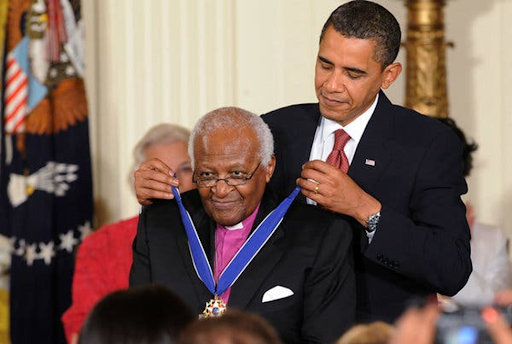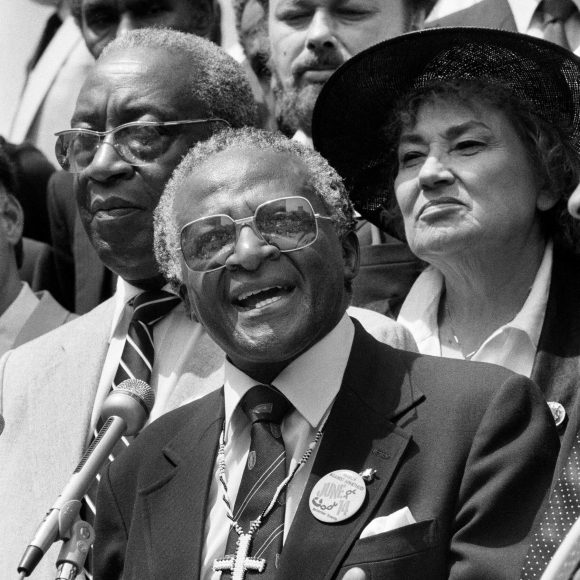
Wilkinson Faculty on Desmond M. Tutu and his Legacy
January 26, 2022
“If you are neutral in situations of injustice, you have chosen the side of the oppressor” – Desmond M. Tutu
Desmond M. Tutu, the archbishop and human rights activist who helped end apartheid in South Africa, died on December 26, 2021. He was 90.
“The history of modern South Africa and indeed the global struggle for human rights cannot be written without reference to Archbishop Desmond Tutu,” said Dr. Adwoa Opong (History).
Professor and Presidential Fellow Prexy Nesbitt (Peace Studies), who worked with Tutu on the World Council of Churches’ Program to Combat Racism, remembers him as a “wonderfully funny person [with the] capacity to speak to all kinds of audiences.”

Archbishop Tutu on the steps of New York’s City Hall in 1986, weeks before a planned anti-apartheid rally. Behind him are Cleveland Robinson, a leader of the protest, and Bella Abzug, the former congresswoman. Credit: Chester Higgins, Jr./The New York Times
“Desmond Tutu’s legacy or his impact globally was in his work as a human rights activist who thought about that world as one community. He attracted admirers and supporters (myself included) through his promotion of Ubuntu Theology, which blended African spiritual and cultural ideas on human dignity, humanity, and connectedness and Christian ideals of forgiveness, reconciliation, and faith,” said Charissa Threat, Associate Professor of History.
Tutu was born on October 7, 1931, in Klerksdorp, South Africa and worked as a teacher, however, he quickly became dismayed with the nature of schooling for Black South African children, consequent to the passage of the Bantu Education Act in 1953, which sought to subjugate the native population. Tutu resigned in protest and soon after, the Bishop of Johannesburg accepted him for the priesthood.
Although in Great Britain for most of the turbulent 1960s and 1970s, Tutu watched his home country from afar. Upon his return, he was appointed Dean of the St. Mary’s Cathedral in Johannesburg. The following year he was consecrated Bishop of Lesotho.
In June 1976, the Soweto Uprising led to several protests where school children were met with police violence. As the South African government became more tyrannical, Tutu became more outspoken from his pulpit.
His tenacity was never so apparent than during his Nobel Peace Prize in 1984, in which he stated, “There is no peace in Southern Africa. There is no peace because there is no justice. There can be no real peace and security until there first be justice enjoyed by all the inhabitants of that beautiful land.”
“As a transnational figure, Tutu took advantage of his global travels and affiliations to press for economic sanctions against the South African government. His national and international fight for an end to White minority rule in South Africa, the release of political prisoners and freedom of expression and association earned him a Nobel Peace Prize in October 1984,” said Dr. Opong.
Unfortunately, Tutu’s work was far from over, and along with his arrest for taking part in an anti-apartheid petition, more injustices, assassination, and bombings faced the country. In 1988, Tutu led 20,000 people to march through Cape Town. The next year apartheid laws begun to relax and finally on February 11, 1990, Nelson Mandela was released from prison after 27 years.

In April 1994, Archbishop Desmond Tutu announces the election of Nelson Mandela as South Africa’s president. (Photo courtesy of Nancy Scheper-Hughes)
Tutu, then, ushered the country into a new era as the chairman of the Truth and Reconciliation Commission to address and document the horrors of the apartheid years. He eventually found himself back in the classroom as a visiting professor and published three books.
“Tutu was a persistent critic of the Apartheid regime and a keen advocate of nonviolence in the anti-apartheid struggle. Under his leadership, the Council of Churches established scholarships for Black youth and organized self-help programs in the Black townships,” said Opong.
Although retired from the spotlight in 2010, Tutu never stopped championing universal human rights.
(Photo above: President Barack Obama presented the Presidential Medal of Freedom to Archbishop Tutu at the White House in 2009. Credit: Jewel Samad/Agence France-Presse — Getty Images.)

